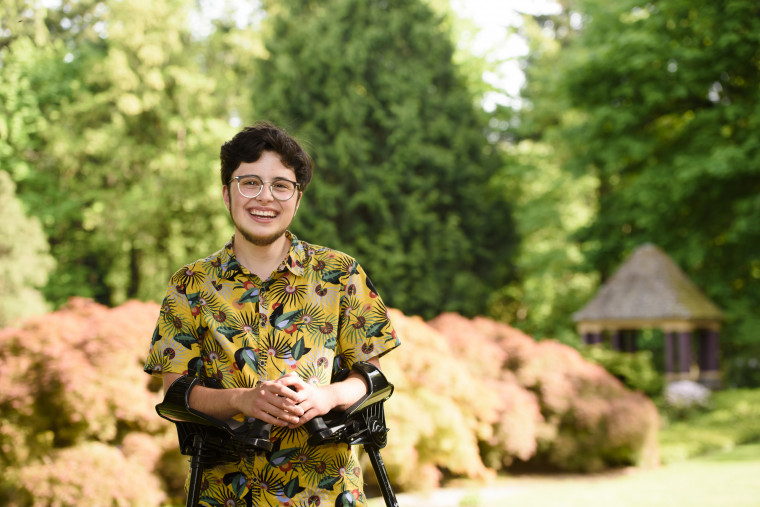Luca Sax

Pronouns
Degree and Class Year
Hometown
Major
Extracurriculars
Overseas study
What three words would you use to describe L&C?
What was your favorite class? How did it expand your knowledge?
My favorite class so far has been Organic Chemistry II with Assistant Professor of Chemistry Casey Jones. Many people are afraid of organic chemistry because it is so different from what they are used to in their general chemistry classes. However, Professor Jones and the rest of the chemistry department, make this knowledge very accessible and interesting to students by connecting theoretical principles to real problems in the life sciences and medicine. Their excitement about the subject, and their willingness to help students, definitely shows in the countless hours that both Professor Jones and the lab instructors put into meeting with students. This also motivated me to continue to work hard in that class. I also love that students are able to collaborate and solve problems together to build a community.
Who is your mentor on campus? Why do you consider this person your mentor?
My mentors on campus are Angela Gintz, the director of the Office of Inclusion and Multicultural Engagement (IME), and Dominique Gardner, the assistant director of IME. The summer before coming to Lewis & Clark, I applied to be a mentee in IME’s mentorship program for students of color and/or first-generation college students. This is where I first experienced Angela and Dom’s passion for creating spaces for students who are a part of underrepresented communities on our campus. Since then, I have joined IME as a peer educator (a student worker who organizes workshops and social events), and have been very lucky to work with Angela and Dom for the past year. They truly lead Lewis & Clark’s institutional inclusion work by example. Their ability to make students feel heard and seen is so crucial for underrepresented students to build community and feel like they belong. Both of their dedication to their work and their willingness to challenge norms inspires me to actively reflect and be engaged in my communities wherever I am.
“For anyone who is looking to get involved with research on campus, don’t be shy! The professors are wonderful and enjoy working with students.”
What made you want to come to Lewis & Clark?
As an international student, I unfortunately wasn’t able to visit Lewis & Clark. However, a friend of mine was already studying here while I was making my decision and she was a wonderful source of information about the college. What made me want to attend Lewis & Clark was a combination of its commitment to social justice and sustainability, the engaged student body, and the academic flexibility with regard to double majoring. Additionally, I also appreciate it being in Portland with access to both the opportunities of the city center and the nature that surrounds campus. As a science major, the amount of scientific research on campus really stood out to me as many small liberal arts colleges don’t have opportunities for undergraduates to get involved in research.
How do you describe the liberal arts?
I decided that I wanted to attend a liberal arts college because I believe that it allows you to learn essential skills. The future of work, as it is being suggested by many researchers today, is one in which everyone will be changing careers more often than ever before. This means that people need the social and technical skills to quickly adapt to new environments and to learn new information independently. A liberal arts education is the perfect preparation for that because you are challenged to explore different disciplines and have the opportunity to pursue passions that seemingly have no overlap. Lewis & Clark, with its connections to alumni in all different types of environments and its location in Portland, gives you the chance to put these skills to practice early on in internships or work.
What’s your favorite spot on campus?
My favorite spot is right outside campus: Tryon Creek State Park. Tryon is a beautiful forest less than five minutes away from campus. It’s the perfect spot to go for a relaxing hike. As someone who grew up with a lot of nature around, being in Tryon really makes me feel at home.
Have you had the opportunity to do research with a professor? If so, please describe the project and the experience.
Since the beginning of this semester, I have been doing research in Professor of Biology Greg Hermann’s lab. For my practicum, I am working on a project about the polarity of the microtubule organizing center within the gut cells of C. elegans embryos by comparing different mutants to the wild type. To do this, I have learned a lot about the maintenance of model organisms and have acquired different fluorescence microscopy skills. My experience in the lab has been fantastic because I have been able to learn a lot from other students and technicians about how scientific research is carried out. At the same time, having weekly meetings with my professor has allowed me to understand the broader scientific context of his research and has given me the opportunity to develop my scientific thinking and independence. For anyone who is looking to get involved with research on campus, don’t be shy! The professors are wonderful and enjoy working with students.
More Admissions Stories
Admissions is located in Frank Manor House on the Undergraduate Campus.
MSC: 32
email admissions@lclark.edu
voice 503-768-7040
fax 503-768-7055
Vice President of Admissions and Financial Aid
Eric Staab
Admissions
Lewis & Clark
615 S. Palatine Hill Road MSC 32
Portland OR 97219

